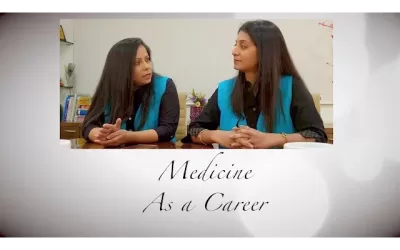 Path to Medical Excellence: Your Journey in a Career of Allopathy
Path to Medical Excellence: Your Journey in a Career of Allopathy
Career in Allopathy – The increasing and complicated lifestyle is giving birth to a variety of ailments and the demand for medical professionals is tremendously increasing day by day. In this episode, Ms. Mugdha Shetye discusses on how to become an allopathic Doctor.
Allopathic medicine treats disease using remedies that will produce symptoms different from the disease treated. Allopathic treatment is based on symptoms and is based on cause and effect’ It focuses on what physical being causes the ailment and what can be done to cure it.
To become a Doctor, One must complete a graduation program i.e. MBBS. MBBS stands for Bachelor of Medicine and Surgery. It is a 5 ½ Years program, post-class 12th. One needs to study 10+2 with Physics, Chemistry and Biology. One needs to clear relevant entrance exams i.e. NEET. Though an MBBS Degree is enough to practice as a Doctor in India, it is not the end of the road. It is necessary to pursue and complete Postgraduate courses such as – MD or MS.
After completing MBBS, Students are required to qualify PG-NEET for further higher education in a specialized field of medicine. The course duration for the Postgraduate course is 3 Years.
Some of the specializations that one can pursue at the MD or MS Level are General medicine, Anaesthesiology, General Surgery, Paediatrics, Cardiology, Gynaecology, Neurology, Tuberculosis and Chest Diseases, Dermatology, Gastroenterology, Psychiatry, Pathology, Forensic Medicine, Radio Therapy, ENT and so on.
Once you have completed your specialization, you have an option to go for Super specialization which is for 2 years. One can pursue super specializations like Clinical hematology, Endocrinology, Gastroenterology, Neuro Surgery, Paediatric Surgery, Plastic Surgery, and so on.
Along with the required qualifications, it is important to understand the personality traits to be successful in the field of medicine. Medical professionals need to possess good stamina, keen & quick observation, good memory & recollection ability, good judgment, logical & analytical mind, decision-making ability, service mentality, stamina, patience, good power of concentration, emotional stability, and self-confidence.
After completing the course a person can start working in his/her own clinic, government/private hospitals, serve in the armed forces, work as a consultant and resident doctor in medical colleges and research institutes, can also work with railways, pharmaceutical and medical companies, biotechnology companies, work in government and private organizations, start teaching or working in research centers.
With the world moving forward at such a fast pace, people are becoming increasingly negligent towards their health. While being constantly surrounded by technologies and leading a work-oriented lifestyle, Gen Z is even more vulnerable to ill health. Owing to the fact that increase in diseases and present lifestyles, the need for good medical professionals is constantly increasing. So, if you intend to make a mark or make a difference in the lives of people then you can surely consider allopathy as a career option.
Frequently Asked Questions For a Career in Allopathy
1. What is allopathy?
Allopathy is a traditional system of medicine that uses pharmacologically active agents to treat symptoms and diseases by creating effects that are opposite to or different from those of the disease.
2. What is a career in allopathy?
A career in allopathy involves becoming a medical doctor (MD) or a physician who practices mainstream medicine, diagnosing and treating illnesses using evidence-based approaches, drugs, and surgical procedures.
3. What qualifications are needed for a career in allopathy?
To become an allopathic doctor, you need to complete a Bachelor of Medicine, and Bachelor of Surgery (MBBS) degree from a recognized medical school, followed by residency training.
4. What skills are important for success in an allopathic career?
Essential skills include strong medical knowledge, diagnostic abilities, effective communication, empathy, critical thinking, and the ability to work in high-pressure environments.
5. How long does it take to become a licensed allopathic doctor?
Becoming an allopathic doctor typically involves completing a 5-6 year MBBS program and then undergoing residency training, which can vary in duration depending on the specialization.
6. What are the different specializations within allopathic medicine?
Allopathic doctors can specialize in various fields such as internal medicine, surgery, pediatrics, obstetrics and gynecology, psychiatry, cardiology, oncology, and more.
7. What is the job outlook for allopathic doctors?
The job outlook for allopathic doctors is generally favorable due to the ongoing demand for medical professionals in healthcare settings.
8. What is the role of an allopathic doctor in patient care?
Allopathic doctors diagnose medical conditions, prescribe medications, recommend treatments, order and interpret medical tests, provide preventive care, and offer guidance to patients.
9. Can allopathic doctors work in both private practice and hospitals?
Yes, allopathic doctors can work in various settings, including private practice, hospitals, clinics, research institutions, and academic medical centers.
10. What is the importance of continuing medical education (CME) for allopathic doctors?
Continuing medical education helps allopathic doctors stay updated with the latest medical advancements, treatments, and technologies, ensuring the delivery of high-quality patient care.
11. How does one handle the emotional aspects of a career in allopathy?
Allopathic doctors often face emotionally challenging situations. Developing emotional resilience, seeking support, and practicing self-care are essential to maintain well-being.
12. What is the impact of technology on allopathic medicine?
Technology has revolutionized allopathic medicine, improving diagnosis, treatment, and patient management through advanced medical equipment, electronic health records, and telemedicine.
13. Are there opportunities for research and academic careers in allopathy?
Yes, many allopathic doctors engage in medical research, teaching, and academic positions, contributing to the advancement of medical knowledge and education.
14. Is international recognition of an allopathic degree important?
Yes, an allopathic degree from a recognized medical school is often required for licensure and practice in many countries worldwide.
15. How can one excel in a career in allopathic medicine?
Excelling in a career in allopathy requires dedication, continuous learning, effective patient communication, compassion, and a commitment to providing evidence-based care.
A career in allopathic medicine offers the opportunity to make a meaningful impact on people’s health and well-being. With the right education, skills, and dedication, you can embark on a rewarding journey in the field of modern medicine.

 Path to Medical Excellence: Your Journey in a Career of Allopathy
Path to Medical Excellence: Your Journey in a Career of Allopathy




